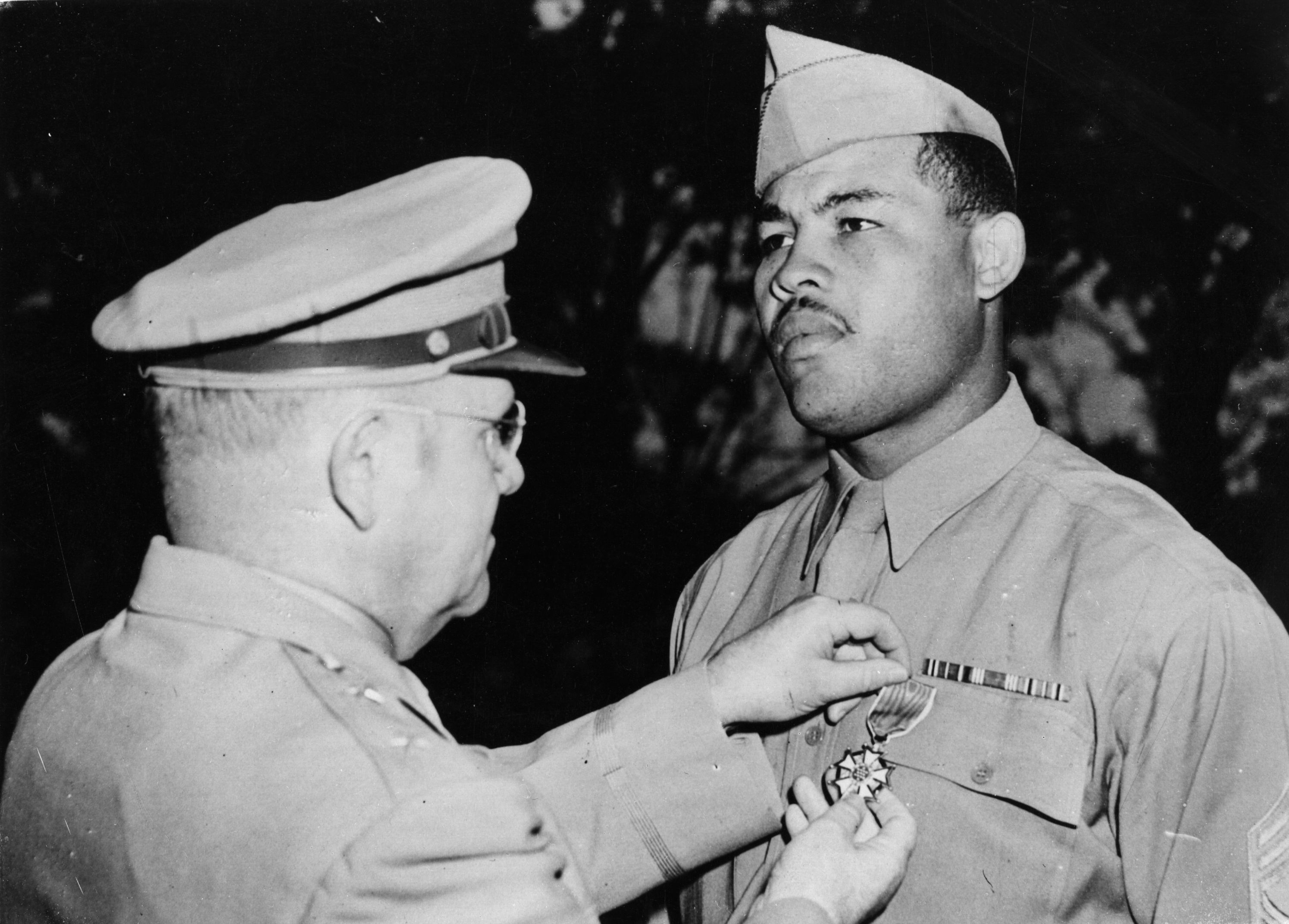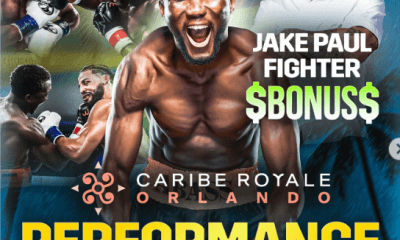Canada and USA
1945: Boxing and Champions

On September 23, 1945, Joe Louis was awarded the Legion of Merit (a military decoration rarely awarded to enlisted soldiers) for “incalculable contribution to the general morale.”
1945: HOW IT WAS — Before WWII ended, boxing was a great way for many people to relieve the indescribable stress of the times. Memories of my late brother, a World War II veteran (1942-45), got me to thinking how things were back then.
If you were a boxing fan during the carefree and happy days that followed 1945, names like Joe Louis, Lee Oma, Lou Nova, Sal Bartolo, Joe Baksi, Charlie Burley, Tami Mauriello, Manuel Ortiz, Gus Lesnevich, Willie Pep, Rocky Graziano, Tony Zale, Jersey Joe Walcott, Sugar Ray Robinson, Marcel Cerdan, Sandy Saddler, Ike Williams, Jake LaMotta, Bert Lytell, Tony DeMarco, Fritzie Zivic, Chuck Davey, Carmen Basilio, and others might resonate. The heavyweight division was dominated by the great Louis, the only man in history to be world champion throughout every year of a decade. He became world champion in 1937 and held the title until 1949, the year in which Sugar Ray Robinson became world welterweight champion, a precursor to becoming the most dominant fighter of the 1950s.
For some, the period following the war was one filled with great fights with the Zale-Graziano trilogy being the icing on the cake, arguably the greatest trilogy in middleweight history. However, for others, WWII marked the beginning of the long decline of boxing in the United States, and also in the rest of the developed world as many boxers who were drafted never fought again, either due to better job opportunities after their service, or death or injury suffered in combat. This was especially so in Europe, but that’s a story for another day.
Tony Zale was among scores of notable boxers who served during or around the war years. Others included Louis, Ezzard Charles, Billy Conn, Bob Satterfield, Carmen Basilio, Beau Jack, Bob Montgomery, Gene Tunney, Jimmy Bivins and too many others to list here. See:
http://boxrec.com/media/index.php/Category:World_War_II_Veterans
Mention of Satterfield brings to mind that the first professional fight I ever witnessed live was one between Art McWhorter and a young Bob Satterfield in 1945 at the Marigold Gardens. Bob won by first round KO as Art went down three times — first from a left hook, then from a vicious Satterfield flurry, and then from another left hook that finished him.
During the War
My parents went about their work days keeping a firm lid on hope, though I remember my mother going to church daily and praying for peace and the safe return of my brother who was poised to go to Japan with the invading American troops. Angst was not a word in those days but if it had been, there was plenty of it in our household. Like everyone else, we were just plain scared to death!
Victory over Europe Day, the day on which the surrender of Germany was announced, officially ended the European phase of World War II on May 7, 1945 and generated much joy. However, the Pacific phase was still going on and the thing Americans dreaded most was that our troops would need to attack Japan in a land invasion to force surrender, and this likely would extend the war and result in a great loss of life. While this fear was mitigated by the dropping of atom bombs on Hiroshima and Nagasaki, there was still a maddening and inexplicable hesitation on the part of Japanese leaders to surrender, notwithstanding the devastation resulting from the two bombs.
A Low Rumble
Back on a steamy mid-August evening in 1945 (having just celebrated my eighth birthday), I was in the cavernous and historic McVickers Movie Theater in Chicago’s Loop with my two older sisters watching a double feature when all of a sudden we heard some noise coming from outside the theater, a low rumble building to a thunderous roar. The movie screen went blank and the ushers told us to go outside. Something big was going on. The American people had been anxiously waiting for this moment. There had been rumors and speculations for several days. The time had to be near; maybe this was it.
It’s over!
The news crackled over a radio headquarters, from 221 Group Royal Air Force, to a primitive U.S. Airstrip at Kinmagon, near Pagan, in Burma. The Japanese had surrendered. At 7:00 PM, Eastern Time, President Harry Truman officially announced around the world the following: “I have received this afternoon a message from the Japanese Government … I deem this … a full acceptance of [the terms of] the unconditional surrender of Japan … arrangements are now being made for the formal signing of surrender terms at the earliest possible moment.” He went on to say, “This is the day we have been waiting for since Pearl Harbor.”
Cities, towns, villages, hamlets, homes, workplaces and streets throughout the United States erupted into pandemonium. It was over! The news soon trickled down to Chicago’s downtown area and to every other place in America and the world. Victory over Japan Day (V-J Day) was on August 15, 1945, the day when fighting with Japan ended, though the surrender wasn’t formally signed until September 2. The day is technically commemorated on August 14 in the United States since the news of the surrender broke on that date in our time zones.
Back to the McVickers Theater
When we got outside, thousands of people were dancing in the streets as far as the eye could see. While still very young, I had some minimal grasp of what all this meant. So did my sisters, both of whom were soon dancing with strangers and screaming at the top of their lungs. So did everyone else. This was a spontaneous celebration the likes of which we may never again witness. People all across America took to the streets to indulge in total and uninhibited joy. Responsible and sober citizens turned fire hoses on each other and engaged in conga lines, wriggling, kicking, and screaming. We did the Bunny Hop before anyone knew there was such a dance. There was confetti, signs, soda pop, beer, kisses, hugs, music and dancing. It was wild. It was joyous.
The implications did not escape me. I would no longer have to help my mother tend to our victory gardens which helped cultivate morale by demonstrating, albeit symbolically, civilian support for the war effort. I also sensed that just maybe I might now be able to get my hands on some Fleers Double Bubble gum made with real sugar, a scarce and much-wanted commodity during the war years. And there would be no more practicing mock air raid drills in grade school, listening to the scary air-raid sirens, and turning off all lights at night. I’d also be going to boxing and wrestling matches with my dad and my brother. We knew that unlike several young men on our city block in Chicago, he would soon be coming home and we could finally remove the Blue-Star flag. Many others—too many others– were not so fortunate and that was cause for profound sadness. For Gold Star mothers, the war never ended.
So now, whenever I happen to hear some old Chicago blues or a tune by Glenn Miller, Harry James or the Andrews Sisters, or when I hear George Shearing and Mel Torme do “Mel and George Do World War II,” I think about those members of the “Greatest Generation” who fought so valiantly–I think about those champions, fellows like Billy Gephardt down at the end of our block who left at such a young age in 1942 and never returned.
Check out more boxing news on video at The Boxing Channel
Ted Sares is one of the world’s oldest active power lifters and holds several records in the Grand Master class. A member of Ring 4’S Boxing Hall of Fame, he enjoys writing about boxing.
-

 Featured Articles3 weeks ago
Featured Articles3 weeks agoThe Hauser Report: Cinematic and Literary Notes
-

 Featured Articles4 weeks ago
Featured Articles4 weeks agoOscar Duarte and Regis Prograis Prevail on an Action-Packed Fight Card in Chicago
-

 Book Review3 weeks ago
Book Review3 weeks agoMark Kriegel’s New Book About Mike Tyson is a Must-Read
-

 Featured Articles1 week ago
Featured Articles1 week agoThe Hauser Report: Debunking Two Myths and Other Notes
-

 Featured Articles2 weeks ago
Featured Articles2 weeks agoMoses Itauma Continues his Rapid Rise; Steamrolls Dillian Whyte in Riyadh
-

 Featured Articles4 weeks ago
Featured Articles4 weeks agoRahaman Ali (1943-2025)
-

 Featured Articles4 weeks ago
Featured Articles4 weeks agoTop Rank Boxing is in Limbo, but that Hasn’t Benched Robert Garcia’s Up-and-Comers
-

 Featured Articles3 weeks ago
Featured Articles3 weeks agoKotari and Urakawa – Two Fatalities on the Same Card in Japan: Boxing’s Darkest Day




















